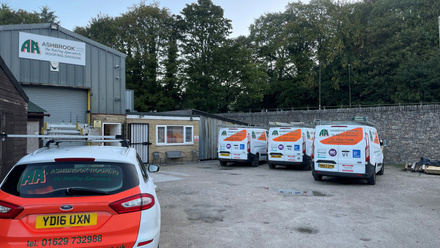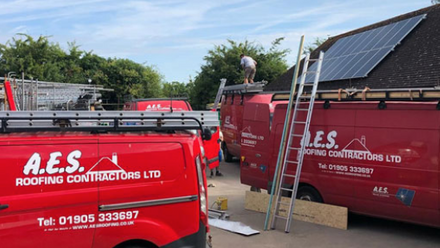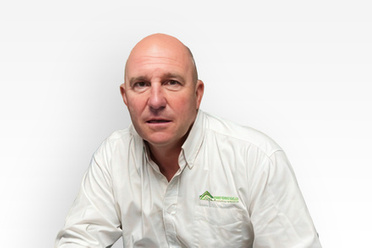On Becoming a Roofer and Starting a Business
You started in the industry back in 1975. Can you tell us about your background and how you founded AL King Roofing?
I started as a trainee roofer after taking a construction course at College, and the realisation hit me quickly that this is a seriously tough way to earn a crust. It’s physically demanding, and you’re out in the elements. But I realised that if I could stick with it and get through the training, I’d never want for work. It’s not a job for everyone so there’s plenty of work to go around.
I started my own business, AL King Roofing, around 1980. The bonus of being young is you have nothing to lose. I did absolutely everything myself: the work, the estimates, my own VAT, and my own PAYE. It took years of tough work, but I gradually built it up. Later, I brought in my father-in-law, a Quantity Surveyor, which gave the business a much more professional aspect. In 2000, I opened up a merchant side to the business so we now sell materials to contractors around the UK.
On National Leadership and the Competent Person Scheme
Your involvement with the NFRC has been extensive, including being National President. How did that lead to your current role as Chairman of the CPS?
I got involved with the regional NFRC committee around the late 90s, focusing heavily on training. I attained an A1 Assessor's Certification and became a Director and Chairman of the Southwest Roof Training Group—I even built a training school at the end of my office!
I eventually joined the National Board and was elected National President around 2016 after starting my journey as Junior Vice President in 2012. That was a huge accolade and a huge responsibility. During that time, we realised we should be running the Competent Person Scheme (CPS) ourselves rather than through a third party. I was heavily involved in bringing the scheme in-house.
When I stepped off the National Board, I was asked to chair the CPS board, a role I’ve been in for about six years.
What is it about the Competent Person Scheme that makes you want to stay?
It’s about raising the bar. The perception of the roofing contractor is pretty poor. An air Commodore once said to me, "Oh, you’re one of these guys that puts a ladder against the gutter and sprinkles a few nails down and charges us huge sums of money for not doing a lot." That is the perception, unfortunately.
With the CPS, you can raise yourself above that. It’s difficult to get into, you are continually inspected and challenged, and you have to keep up to date with legislation. As a contractor, it proves you are serious, and it’s a great marketing tool to say, "I can self-certify this," which is as good as having local area building control do it.
The Industry’s Biggest Challenges
What are the biggest issues facing professional and decent roofing contractors like yourself today?
There’s a multitude of problems. Firstly, rogue traders. I’ve seen heartbreaking jobs where a homeowner was seriously ripped off and intimidated by a contractor who had done nothing correctly—not even using scaffolding. That leaves a huge scar on the public. Secondly, the challenges with tier-one contractors and developers. We are not treated well and one of the biggest financial issues we face is retention. They will hold 5% of the contract value back in case of defects. You get half of that after practical completion, but the other half can be held for a two-year defects period. For a small company like mine, we have hundreds of thousands of pounds out in retention.
Site readiness is another challenge we often face, whereby we’ve geared up our crews and materials, only to be told the site’s not ready, forcing us to work out of sequence. Main contractors need to understand the knock-on effects of these actions and how such practices affect all professional trades who want to complete their work to a professional and competent standard without being compromised.
The ageing workforce and recruitment are also major concerns, aren’t they?
It is a huge problem. The reality is that for every one guy that comes in as a starter, we lose two at the other end. Roofing is very hard and physically demanding on the body. We’ve also got a massive perception issue with young people. I asked a group of my college-age daughter’s friends if they had considered construction, and they almost scoffed at the thought of a career doing something manual.
We need to make it clear that roofing is a legitimate and worthwhile career choice. You don’t go roof-tiling because you’ve failed at everything else. It can be a highly professional, well-paid career, but we need to do more to raise that profile.
The Future of the Competent Person Scheme
You mentioned that the poor public awareness of the Competent Person Scheme is a major hurdle. What is next for the scheme?
Public awareness is the biggest thing. People are aware that if you’re having electrical or gas work done, you must use a contractor that’s professionally certified; these are givens. The thing that worries me is it's not known that you have to have certification if you’re stripping more than 50% of your roof off. The public often lacks knowledge. It’s important that we get that message out there. It’s not widely known among solicitors doing conveyancing either, who often try to resolve documentation issues retrospectively, which we can’t do. Our future strategy is to raise awareness to the public, so homeowners know to say “I need somebody that’s certificated” when they’re having roof refurbishment work done. CPS contractors should be one of those well-known, non-negotiable standards for homeowners.



